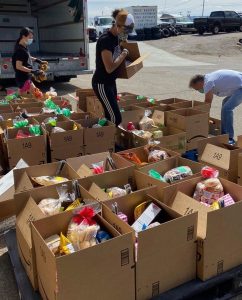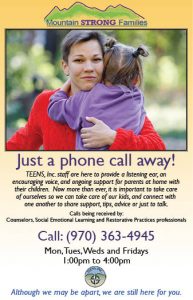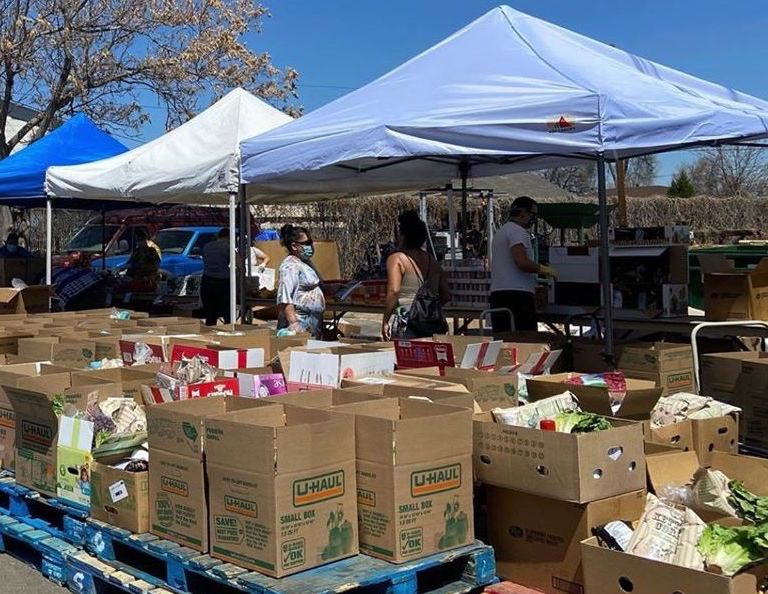Above: In response to the pandemic, on Wednesdays, Re:Vision partners with Kaizen Food Rescue and Lifespan Local to bring a no-cost grocery program to Westwood families. (Photo courtesy of Re:Vision)
By The JVA Resource Development Team
Amid the unprecedented challenges caused by the coronavirus pandemic, JVA has been supporting nonprofits as they pivot in thoughtful, creative ways to meet their communities’ changing needs. In hopes of providing a bit of inspiration, our grants team asked some of our Grantwriter, Only Better clients to talk about how their work has changed in response to COVID-19. Here’s what they said:
- Denver Children’s Advocacy Center (DCAC) works with children and the families of children who are victims of child abuse, neglect and violence and has had to shift essential mental health services to a teletherapy format.
DCAC works closely with Denver Public Schools in neighborhoods that have been hardest hit by the pandemic. As a result, DCAC’s therapists are taking additional cases from school counselors who are being overwhelmed with calls from their community. To ensure meaningful connection and effective teletherapy, especially with young children, DCAC approaches each session with flexibility and creativity.
Because parents’ fear and anxiety has a negative impact on children’s mental health, DCAC is working harder to provide stability for the whole family and assuage their fears. DCAC has helpful resources on its YouTube channel and Facebook page and is launching a free webinar series starting May 6. You can register here.
- Because COVID-19 is disrupting the way that people seek and receive health care, Prime Health is busy training health care providers about credible, accurate, cost-effective ways to deliver telehealth. Equity is a motivating value for Prime Health, and it is particularly vested in providing technical assistance to providers who serve vulnerable patients who are more likely to experience health disparities and have poorer health outcomes.

On Wednesdays, Re:Vision partners with Kaizen Food Rescue and Lifespan Local to bring a no-cost grocery program to Westwood families.
- Although Re:Vision’s focus is on long-term food access solutions and systems change, because of the current crisis, it shifted quickly to meet the Westwood neighborhood’s emergency food and economic needs.
With the support of partners such as Kaizen Food Rescue, Re:Vision distributes 40- to 60-pound food boxes to 100 to 150 families each Wednesday through the Westwood Food Cooperative. It also offers 250 free chef-prepared grab-and-go meals Monday–Friday each week through its entrepreneurial community center, RISE Westwood. And it has continued to reach out virtually to help local families with their backyard gardens this season—as well as to urge them to complete the 2020 census.
Re:Vision is also supporting local mission-aligned entrepreneurs through RISE Westwood Collective, including X’Tabai Yucateco, XATRUCHO and Cultura Craft Chocolate, through the creation of a virtual marketplace. Check out the collective’s online Mother’s Day Mercadito, through which you can order items now for pickup May 8–10.
- TEENS, Inc. in Nederland is using its resources and vast network throughout the Peak-to-Peak region (parts of Boulder, Gilpin and Jefferson counties) to help families who have lost income because of COVID-19.

TEENS, Inc. has begun operating a hotline that families can call to get support with parenting.
While some of TEENS, Inc.’s programs have been paused (e.g., its high school, its preschool and its youth drop-in center), it has shifted its services to offer a food pantry four days a week, provide emergency financial support, operate a hotline that families can call to get support with parenting, and expand its social media to support community members. It is also acting as a coordinating agency so that all of the area’s service providers can help without unnecessary duplication.
- Think 360 Arts for Learning (Think 360) delivers high-caliber arts education programs to students, teachers, older adults and youth offenders in Colorado. After the COVID-19 pandemic brought many of its programs to an unexpected halt, the organization quickly pivoted professional development programming to a live videoconferencing platform primarily focused on social-emotional learning strategies.
Think 360 also created a media platform on its YouTube channel, populated with free artist-created content, and is creating hybrid programs that use both artist-created educational videos and live in-person teaching via videoconferencing.

Think 360 Arts for Learning artist Chelsea Gilmore led a bookmaking workshop with older adults via Zoom and video.
To creatively engage and maintain connection with older adults, Think 360 artist Chelsea Gilmore worked with older adults through Parker Arts Center using a combination of live Zoom teaching and a video for participants to watch at their own pace. She led participants through a bookmaking workshop, using recycled materials. Photos can be seen on Think 360’s Facebook page.
Additionally, artist Adri Norris continued her residency with Sage at the Rockies, making ’zines (short graphic novels) with older adults that depict how they will all celebrate when this period of isolation is over.
Recognizing that technology is not equally accessible, Think 360 is also working with the Denver Public Library to distribute portable “art boxes” for older adults. The art boxes will include an artist-created lesson, instructions and necessary art supplies.
Has your organization pivoted to accommodate social distancing or to meet pressing new needs among the population you serve? Share your story! It could help inspire others facing similar challenges.







Leave A Comment